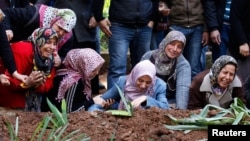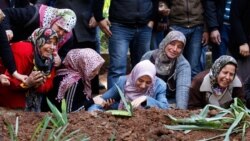The distressing reality is that, increasingly, civilians have become the victims of armed conflict. “Few are more likely to be the victims of mass atrocities than civilians caught in armed conflict,” said United States Ambassador to the United Nations Susan Rice before the UN Security Council.
“Time and again – and all too often – the world bears witness to the horror of mass killings, sexual violence and gross human rights violations and abuses of innocents in conflict.”
The primary responsibility for protecting their own populations falls to individual governments. But too many governments fail to do so, be it due to their lack of capacity or will, or because a few governments condone, or even perpetrate atrocities against their own people. And that is when the international community, and specifically the United Nations, must step in, said Ambassador Rice:
“In this regard, I want to highlight the horrific attacks by the Syrian regime on the Syrian people, including the widely reported targeting of hospitals and health centers and the use of ballistic missiles against civilian populations. The carnage unleashed by Assad merits universal indignation and strong action from this Council. When the people of Libya were on the verge of being slaughtered by a brutal dictator, this Council acted, prevented a massacre, and saved countless lives. This should remind us that for civilians in conflict, Security Council action can mean the difference between life and death.”
Allowing unimpeded humanitarian access to populations in need of help is another facet of protection for civilian populations. The practice of preventing humanitarian aid from reaching people in distress, as has been happening in Sudan’s Southern Kordofan and Blue Nile states, is appalling and unacceptable.
The United States also strongly rejects impunity, and supports efforts to hold violators of international humanitarian law and international human rights law, accountable for their actions. Indeed, accountability for atrocities can lay a foundation for rule of law and prevent instability by promising that there will be justice and redress for victims. The United States supports the Secretary General’s call for greater Security Council involvement in addressing violations of international law.
“The protection of civilians is a fundamental element of the Security Council’s obligation to ensure international peace and security,” said Ambassador Rice.
“While national action is necessary, it is not sufficient. International, collective action is required, and we look forward to strengthening our cooperation with the United Nations and member states to that end.”
“Time and again – and all too often – the world bears witness to the horror of mass killings, sexual violence and gross human rights violations and abuses of innocents in conflict.”
The primary responsibility for protecting their own populations falls to individual governments. But too many governments fail to do so, be it due to their lack of capacity or will, or because a few governments condone, or even perpetrate atrocities against their own people. And that is when the international community, and specifically the United Nations, must step in, said Ambassador Rice:
“In this regard, I want to highlight the horrific attacks by the Syrian regime on the Syrian people, including the widely reported targeting of hospitals and health centers and the use of ballistic missiles against civilian populations. The carnage unleashed by Assad merits universal indignation and strong action from this Council. When the people of Libya were on the verge of being slaughtered by a brutal dictator, this Council acted, prevented a massacre, and saved countless lives. This should remind us that for civilians in conflict, Security Council action can mean the difference between life and death.”
Allowing unimpeded humanitarian access to populations in need of help is another facet of protection for civilian populations. The practice of preventing humanitarian aid from reaching people in distress, as has been happening in Sudan’s Southern Kordofan and Blue Nile states, is appalling and unacceptable.
The United States also strongly rejects impunity, and supports efforts to hold violators of international humanitarian law and international human rights law, accountable for their actions. Indeed, accountability for atrocities can lay a foundation for rule of law and prevent instability by promising that there will be justice and redress for victims. The United States supports the Secretary General’s call for greater Security Council involvement in addressing violations of international law.
“The protection of civilians is a fundamental element of the Security Council’s obligation to ensure international peace and security,” said Ambassador Rice.
“While national action is necessary, it is not sufficient. International, collective action is required, and we look forward to strengthening our cooperation with the United Nations and member states to that end.”






